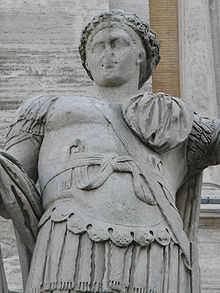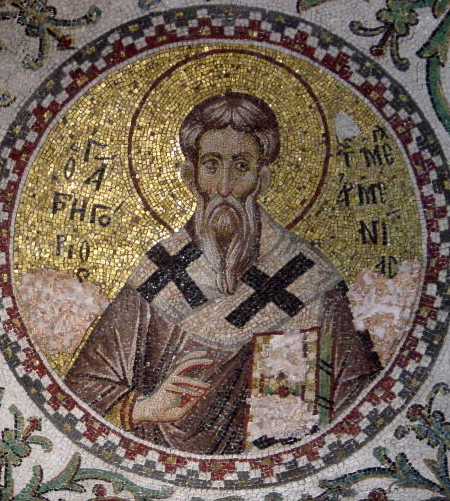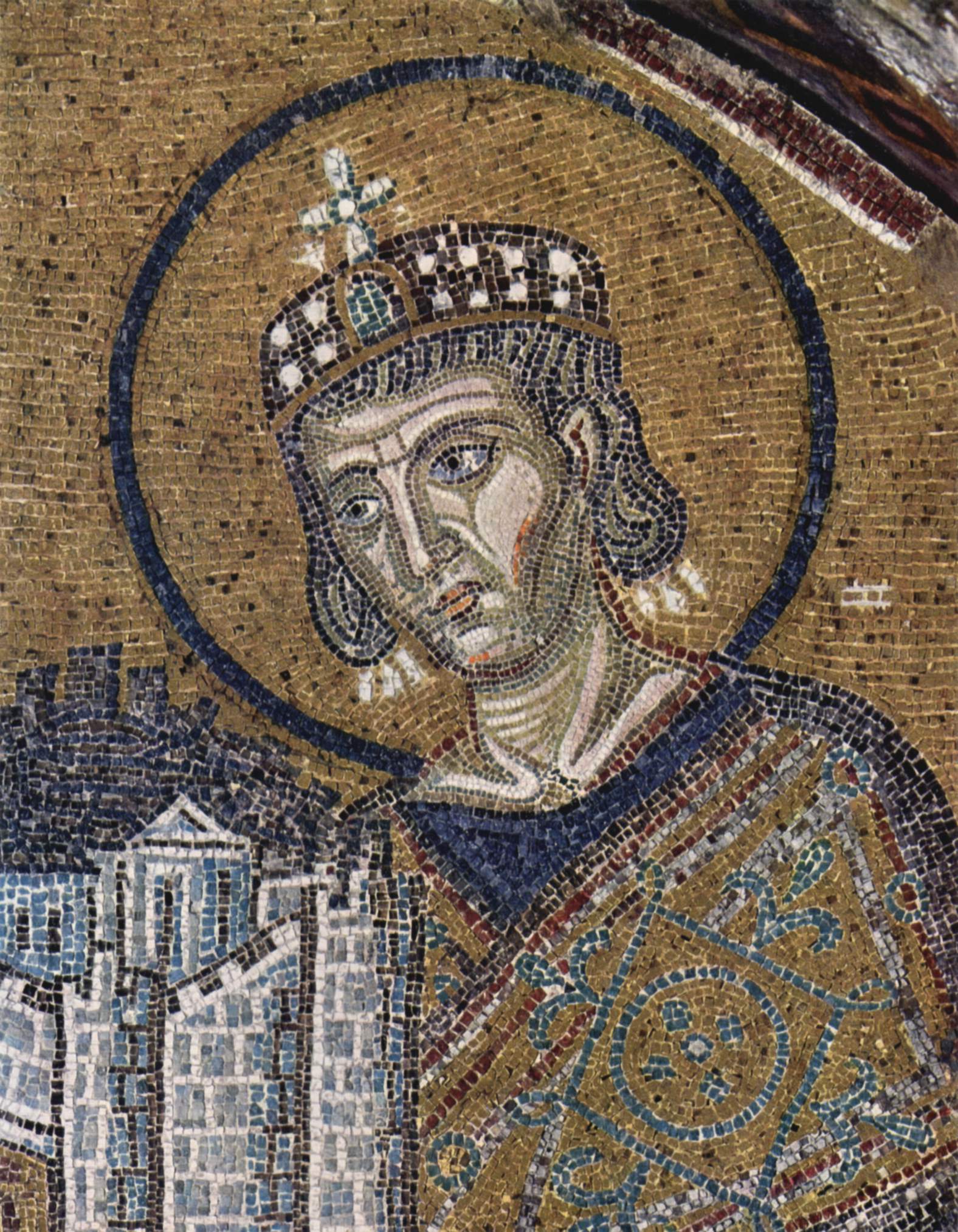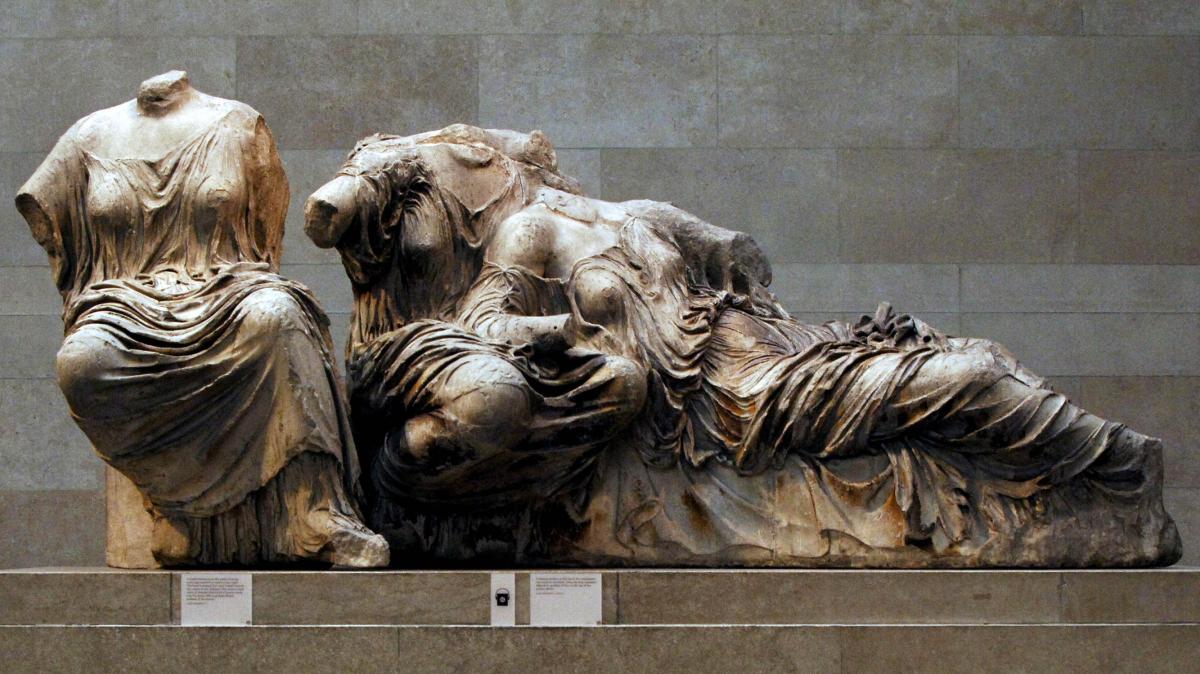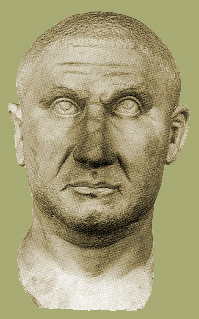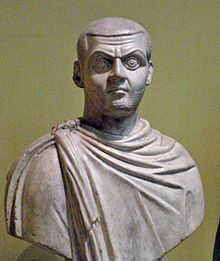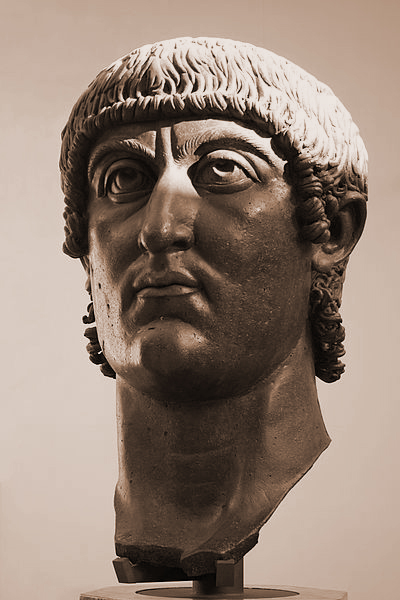White nationalists know very little about the history of the religion of our parents. This summary of Demolish Them, a book by Vlassis Rassias (pic below) published in Greek and posted on Thulean Perspective, is just a taste of the flavour of what I plan to translate from Karlheinz Deschner’s Kriminalgeschichte des Christentums. Pay special attention how evil Christians, many of Semitic background, used the word ‘gentiles’ to refer to white advocates of Greco-Roman civilisation:
______ 卐 ______
 314
314
Immediately after its full legalisation, the Christian Church attacks the Gentiles: The Council of Ancyra denounces the worship of Goddess Artemis.
324
Emperor Constantine declares Christianity as the only official religion of the Roman Empire. At Dydima, Asia Minor, he sacks the Oracle of God Apollo and tortures its Pagan priests to death. He also evicts the Gentiles from Mt. Athos and destroys all local Hellenic Temples.
326
Emperor Constantine, following the instructions of his mother Helen, destroys the Temple of God Asclepius in Aigeai of Cilicia and many Temples of Goddess Aphrodite in Jerusalem, Aphaca, Mambre, Phoenice, Baalbek, etc.
330
Constantine steals the treasures and statues of the Pagan Temples in Greece to decorate Nova Roma (Constantinople), the new capital of his Empire.
335
Constantine sacks many Pagan Temples of Asia Minor and Palestine and orders the execution by crucifixion of ‘all magicians and soothsayers’. Martyrdom of the neoplatonist philosopher Sopatros.
341
Emperor Constas, son of Constantinus, persecutes ‘all the soothsayers and the Hellenists’. Many Gentile Hellenes are either imprisoned or executed.
346
New large-scale persecutions against the Gentiles in Constantinople. Banishment of the famous orator Libanius accused as… ‘magician’.
353
An edict of Constantius orders the death penalty for all kind of worship through sacrifices and ‘idols’.
354
A new edict of Constantius orders the closing of all Pagan Temples. Some of them are profaned and turned into brothels or gambling rooms. Executions of Pagan priests. First burning of libraries in various cities of the Empire. The first lime factories are built next to closed Pagan Temples. A large part of Sacred Gentile architecture is turned into lime.
356
A new edict of Constantius orders the destruction of the Pagan Temples and the execution of all ‘idolaters’.
357
Constantius outlaws all methods of Divination (Astrology not excluded).
359
In Skythopolis, Syria, Christians organise the first death camps for the torture and execution of arrested Gentiles from all around the Empire.
361 to 363
Religious tolerance and restoration of Pagan cults declared in Constantinople (11th December 361) by the Pagan Emperor Julian.
363
Assassination of Emperor Julian (26th June).
364
Emperor Flavius Jovianus orders the burning of the Library of Antioch. An Imperial edict (11th September) orders the death penalty for all Gentiles that worship their ancestral Gods or practice Divination (‘sileat omnibus perpetuo divinandi uriositas’). Three different edicts (4th February, 9th September, 23rd December) order the confiscation of all properties of Pagan Temples and the death penalty for participation in Pagan rituals, even private ones.
365
An Imperial edict (17th November) forbids Gentile officers of the army to command christian soldiers.
370
Emperor Valens orders a tremendous persecution of Gentiles throughout the Eastern Empire. In Antioch, among many other Pagans, the ex-governor Fidustius and the priests Hilarius and Patricius are executed. Tons of books are burnt in the squares of cities of the Eastern Empire. All friends of Julian are persecuted (Orebasius, Sallustius, Pegasius etc.), the philosopher Simonides is burned alive and the philosopher Maximus is decapitated.
372
Emperor Valens orders the governor of Asia Minor to exterminate the Hellenes and all documents of their wisdom.
373
New prohibition of all methods of Divination. The Newspeak term ‘Pagan’ (pagani, villagers) is introduced by the christians to lessen the Gentiles.
375
The Temple of God Asclepius in Epidaurus, Greece, is closed down.
380
On 27th February, Christianity becomes the exclusive religion of the Roman Empire by an edict of Emperor Flavius Theodosius, requiring that
‘all the various nations, which are subject to our clemency and moderation should continue in the profession of that religion, which was delivered to the Romans by the divine Apostle Peter’.
Non-christians are called ‘loathsome, heretics, stupid and blind’. In another edict Theodosius calls ‘insane’ those that do not believe in the christian god and outlaws all disagreements with the Church dogmas. Ambrosius, bishop of Milan, starts destroying all the Pagan Temples of his area. Christian priests lead the mob against the Temple of Goddess Demeter in Eleusis and try to lynch the hierophants Nestorius and Priskus. The 95 year-old hierophant Nestorius, ends the Eleusinian Mysteries and announces the predominance of mental darkness over the human race.
381
On 2nd May, Theodosius deprives all rights of christians that return to the Pagan Religion. Throughout the Eastern Empire, Pagan Temples and Libraries are looted or burned down. On 21st December, Theodosius outlaws even simple visits to the Temples of the Hellenes. In Constantinople, the Temple of Goddess Aphrodite is turned into a brothel and the Temples of Sun and Artemis into stables.
382
‘Hellelu-jah’ (Glory to Yahweh) is imposed in the christian mass.
384
Emperor Theodosius orders the Praetorian Prefect, Maternus Cynegius, a dedicated christian, to cooperate with the local bishops and destroy the Temples of the Gentiles in Northern Greece and Asia Minor.
385 to 388
Maternus Cynegius, encouraged by his fanatic wife, and bishop, ‘Saint’ Marcellus with his gangs scour the countryside, sack and destroy hundreds of Hellenic Temples, shrines and altars. Amongst others they destroy the Temple of Edessa, the Cabeireion of Imbros, the Temple of Zeus in Apamea, the Temple of Apollo in Dydima and all the Temples of Palmyra. Thousands of innocent Gentiles from all sides of the Empire suffer martyrdom in the notorious death camps of Skythopolis.
386
Emperor Theodosius outlaws (16th June) the care of sacked Pagan Temples.
388
Public talks on religious subjects are also outlawed by Theodosius. The old orator Libanius sends his famous Epistle Pro Templis to Theodosius, with a hope that the few remaining Hellenic Temples will be respected and spared.
389 to 390
All non-christian calenders are outlawed. Hordes of fanatic hermits from the desert flood into Middle Eastern and Egyptian cities, destroying statues, altars, libraries and Pagan temples, whilst Gentiles are lynched. Theophilus, Patriarch of Alexandria, starts heavy persecutions against the Gentiles, turns the Temple of Dionysos into a church, burns down the Mithraeum of the city, destroys the Temple of Zeus and burlesques the Pagan priests before they are killed by stoning. The christian mob profanes the cult images.
391
On 24th February, a new edict of Theodosius prohibits not only visits to Pagan Temples but also looking at vandalised statues. New heavy persecutions all around the Empire. In Alexandria, Egypt, the Gentiles, led by the philosopher Olympius, revolt and after some street fights, finally lock themselves inside the fortified Temple of God Serapis (The Serapeion). After a violent siege, the christians occupy the building, demolish it, burn its famous Library and profane the cult images.
392
On 8th November, the Emperor Theodosius outlaws all non-christian rituals and names them ‘superstitions of the Gentiles’ (gentilicia superstitio). New full scale persecutions against the Gentiles. The Mysteries of Samothrace are ended and priests slaughtered. In Cyprus the local bishop, ‘Saints’ Epiphanius and Tychon destroy almost all the Temples of the island and exterminate thousands of Gentiles. The local Mysteries of Goddess Aphrodite are ended. Theodosius’ edict declares: ‘the ones that won’t obey pater Epiphanius have no right to keep living on the island’. The Gentiles revolt against the Emperor and the Church in Petra, Aeropolis, Rafia, Gaza, Baalbek and other cities of the Middle East.
393
The Pythian, Aktia and Olympic Games are outlawed as part of the Hellenic ‘idolatry’. Christians sack the Temples of Olympia.
395
Two new edicts (22nd July and 7th August) lead to new persecutions against the Gentiles. Rufinus, the eunuch Prime Minister of Emperor Flavius Arcadius directs the hordes of the baptised Goths (led by Alaric) to the country of the Hellenes. Encouraged by christian monks, the barbarians sack and burn many cities (Dion, Delphi, Megara, Corinth, Pheneos, Argos, Nemea, Lycosoura, Sparta, Messene, Phigaleia, Olympia, etc.), slaughter or enslave innumerable Hellenes and burn the Temples. Among others, they burn down the Eleusinian Sanctuary and burn alive all of its priests (including the hierophant of Mithras Hilarius).
396
On 7th December, a new edict by Emperor Arcadius orders that Paganism be treated as high treason. Imprisonment of the few remaining Pagan priests and hierophants.
397
‘Demolish them!’ Emperor Flavius Arcadius orders all the still erect Pagan Temples demolished.
398
The Fourth Church Council of Carthage prohibits to all, including its bishops, the study of Gentile books. Porphyrius, bishop of Gaza, demolishes almost all the Pagan Temples of his city (except nine of them that remain active).
399
With a new edict (13th July) Emperor Flavius Arcadius orders all remaining Temples, mainly in the countryside, to be immediately demolished: Si qua in agris templa sunt, sine turba ac tumultu diruantur. His enim deiectis atque sublatis omnis superstitioni materia consumetur.
400
Bishop Nicetas destroys the Oracle of God Dionysus in Vesai and baptises all the Gentiles of this area.
401
The christian mob of Carthage lynches Gentiles and destroys Temples and ‘idols’. In Gaza too, the local bishop, also a ‘Saint’, Porphyrius sends his followers to lynch Gentiles and demolish the remaining nine still active Temples of the city. The 15th Council of Chalkedon orders all christians that still keep good relations with their gentile relatives to be excommunicated (even after their death).
405
John Chrysostom sends his hordes of gray-clad monks armed with clubs and iron bars to destroy the ‘idols’ in all the cities of Palestine.
406
John Chrysostom collects funds from rich christian women to financially support the demolition of the Hellenic Temples. In Ephessus, he orders the destruction of the famous Temple of Goddess Artemis. In Salamis, Cyprus, ‘Saints’ Epiphanius and Eutychius continue persecutions of the Gentiles and the total destruction of their Temples and sanctuaries.
407
A new edict outlaws once more all non-christian acts of worship.
408
The Emperor of the Western Empire Honorius and the Emperor of the Eastern Empire Arcadius, order together that all sculptures of the Pagan Temples be either destroyed or confiscated. Private ownership of Pagan sculpture is also outlawed. The local bishops lead new heavy persecutions against Gentiles and new book burning. Judges showing pity for Gentiles are also persecuted.
409
Once again, an edict orders Astrology and all methods of Divination to be punished by death.
415
In Alexandria, Egypt, the mob urged by the bishop Cyrillus, attacks a few days before the judaeo-christian Pascha (Pesach-Easter) and hacks to pieces the famous and beautiful philosopher Hypatia. Pieces of her body are paraded by the christian mob through the streets of Alexandria, and are finally burned together with her books in a place called Cynaron. On 30th August, new persecutions start against all the Pagan priests of North Africa, who end their lives either crucified or burned alive.
416
The inquisitor Hypatius, alias ‘The Sword of God’, exterminates the last Gentiles of Bithynia. In Constantinople (7th December), all non-christian army officers, public employees and judges are dismissed.
423
Emperor Theodosius II, declares (8th June) that the Religion of the Gentiles is nothing more than ‘demon worship’ and orders all those who persist in practicing it to be punished by imprisonment and tortured.
429
The Temple of Goddess Athena (Parthenon) on the Acropolis of Athens is sacked. Athenian Pagans are persecuted.
435
On 14th November, a new edict by Theodosius II orders the death penalty for all ‘heretics’ and ‘pagans’ of the Empire. Only Judaism is considered a legal non-christian Religion.
438
Theodosius II issues an new edict (31st January) against the Gentiles, incriminating their ‘idolatry’ as the reason for a recent
plague!
440 to 450
The christians demolish all the monuments, altars and Temples of Athens, Olympia, and other Greek cities.
448
Theodosius II orders all non-christian books burned.
450
All the Temples of Aphrodisias (City of Goddess Aphrodite) are demolished and its Libraries burned down. The city is renamed Stauroupolis (City of the Cross).
451
A new edict by Theodosius II (4th November) emphasises that ‘idolatry’ is to be punished by death.
457 to 491
Sporadic persecutions against Gentiles of the Eastern Empire. Among others, the physician Jacobus and the philosopher Gessius are executed. Severianus, Herestios, Zosimus, Isidorus and others are tortured and imprisoned. The proselytiser Conon and his followers exterminate the last Gentiles of the island of Imbros, in the northeast Aegean. The last worshippers of Lavranius Zeus are exterminated in Cyprus.
482 to 488
The majority of the Gentiles of Asia Minor are exterminated, after a desperate revolt against the Emperor and the Church.
486
More ‘underground’ Pagan priests are discovered, arrested, burlesqued, tortured and executed in Alexandria, Egypt.
515
Baptism becomes obligatory, even for those that already say they are christian. The Emperor of Constantinople, Anastasius orders the massacre of the Gentiles in the Arabian city Zoara and the demolition of the Temple of local God Theandrites.
528
Emperor Jutprada (Justinianus) outlaws the ‘alternative’ Olympian Games of Antioch. He also orders the execution (by fire, crucifixion, tearing to pieces by wild beasts, or cutting by iron nails) of all who practice ‘sorcery, divination, magic or idolatry’ and prohibits all teachings by the Gentiles (‘..the ones suffering from the blasphemous insanity of the Hellenes’).
529
Emperor Justinianus outlaws the Athenian Philosophical Academy, which has its property confiscated.
532
The inquisitor Ioannis Asiacus, a fanatical monk, leads a crusade against the Gentiles of Asia Minor.
542
Emperor Justinianus allows the inquisitor Ioannis Asiacus to convert the Gentiles of Phrygia, Caria and Lydia in Asia Minor. Within 35 years of this crusade, 99 churches and 12 monasteries are built on the sites of demolished Pagan Temples.
546
Hundreds of Gentiles are put to death in Constantinople by the inquisitor Ioannis Asiacus.
556
Justinianus orders the notorious inquisitor Amantius to go to Antioch, to find, arrest, torture and exterminate the last Gentiles of the city and burn all the private libraries down.
562
Mass arrests, burlesquing, tortures, imprisonments and executions of Gentile Hellenes in Athens, Antioch, Palmyra and Constantinople.
578 to 582
Christians torture and crucify Gentile Hellenes all around the Eastern Empire, and exterminate the last Gentiles of Heliopolis (Baalbek).
580
Christian inquisitors attack a secret Temple of Zeus in Antioch. The priest commits suicide, but the other Gentiles are arrested. All the prisoners, the Vice Governor Anatolius included, are tortured and sent to Constantinople to face trial. Sentenced to death they are thrown to the lions. The wild animals are unwilling to tear them to pieces and they end up crucified. Their corpses are dragged through the streets by the christian mob and afterwards thrown unburied in the city dump.
583
New persecutions against the Gentile Hellenes by the Emperor Mauricius.
590
Throughout the Eastern Empire, christian accusers ‘discover’ Pagan conspiracies. A new wave of torture and executions erupts.
692
The ‘Penthekte’ Council of Constantinople prohibits the remains of Calends, Brumalia, Anthesteria, and other Pagan / Dionysian festivals.
804
The Gentile Hellenes of Laconia, Greece, resist successfully the attempt of Tarasius, Patriarch of Constantinople, to convert them to Christianity.
950 to 988
Violent conversion of the last Gentile Hellenes of Laconia by the Armenian ‘Saint’ Nikon.
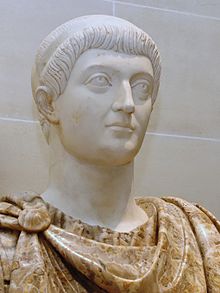 (Bust of Constans)
(Bust of Constans)